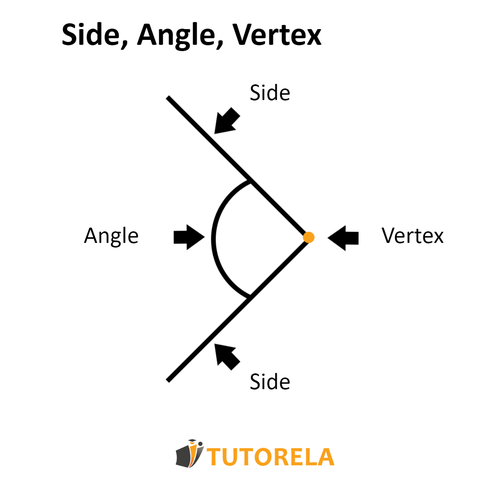Assignment
Given the angles between parallel lines:
What is the value of: X?
Solution
We will mark the angle adjacent to the angle equal to 94o with the letter Z and find its value through the following calculation:
Z=180−94=86
Now we will focus on the triangle to find X and remember that the sum of the angles in a triangle is equal to: 180o
X+86+53=180
X+139=180
X=180−139
X=41
Answer
41o
Assignment
At the vertices of a square with a side length of Y cm, 4 squares each with a side length of X cm are drawn
What is the area of the entire shape?
Solution
The area of the entire shape is composed of the area of 4 small squares and the area of one large square.
Let's calculate the area of a small square
x×x=x2
Therefore, the area of 4 squares will be equal to: 4x2
The area of the large square is equal to: y×y=y2
Thus, the total area of the shape will be equal to: 4x2+y2
Answer
4x2+y2
Prompt
Given that A,B are two vertices in a rectangle.
How many rectangles can be drawn so that A,B are adjacent vertices?
Solution
Answer:
4
Assignment
Given that B,D are two bisectors in a rectangle.
How many rectangles can be drawn so that BD is a diagonal in them?
Answer
3
The answer is quite simple.
Many students fear pop quizzes, but in reality, they are an opportunity to exercise and demonstrate your knowledge.
As long as you study throughout the year and not just before exams.
- Knowing there will be a quiz usually motivates you to do your homework.
- Avoid falling behind with the study material, and stay up-to-date with the latest classes.
- Quizzes often test your knowledge on just one topic. For example: calculating the area of a trapezoid.
- Quizzes are calculated into an annual average, so it's in your best interest to obtain the best possible grade on each one.
As long as you pay attention in class and do your homework, you have no reason to fear exams.
Is there an area of geometry that you don't understand? That's normal, as there are topics you'll learn easily, and others that will be more challenging for you.
Important: don't fall behind with the study material, because in mathematics, the pace of learning is very fast.
The problem is that many topics are based on what was taught before. Therefore, the moment your understanding of a certain topic is partial, you will struggle to grasp the next topic.
How do you know if you've fallen behind with the study material?
- You find it difficult to concentrate in class because you struggle to understand the teacher.
- You have difficulty solving homework assignments.
You received a very low grade on a test, which reflects your level.
What can you do in this case?
- You can ask a classmate to explain what you don't understand.
- Ask your math teacher for help with the topic you haven't understood.
- You can take lessons with a private tutor to explain the topic you haven't understood, from the beginning.
Study mathematics with a private tutor
There are students who struggle to keep up with the learning pace in class.
It's important to understand that the ability to quickly learn what is taught is not necessarily related to the student's ability to understand different topics taught, and even to pass exams with good grades.
Sometimes math teachers teach very quickly to cover all the topics of the annual program. This way, there are students who fail to properly understand the different explanations and formulas, and gradually fall behind.
With a private math tutor, you can not only learn all the topics you haven't understood, but also assimilate the material effectively.
A private tutor can help you pass high school exams, and of course, prepare you for college.
It is also possible to take classes with a private tutor through your computer, with our online study program.
This way, you can enjoy private lessons with high-level teachers, without leaving your home.
This platform offers a wide variety of private tutors. You can read different opinions and comments about each teacher.
This means that you can quickly get an idea about the profile of each teacher, and thus you can easily choose the tutor who will accompany you in the learning process.











